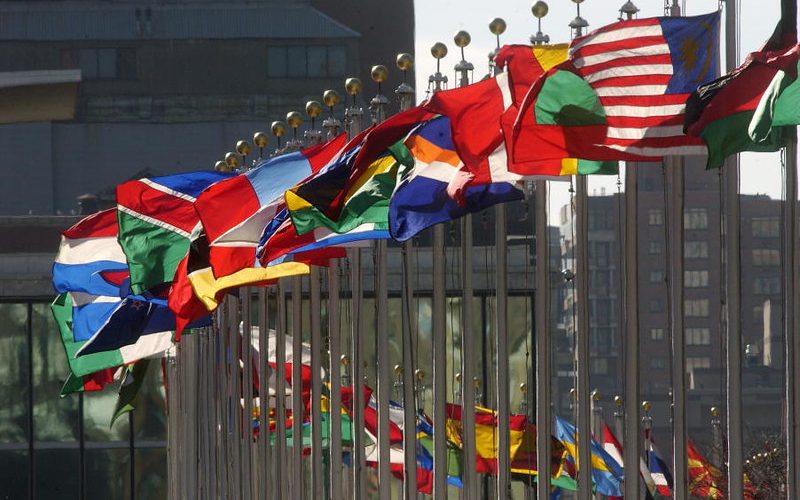Bruce Jentleson in his work American Foreign Policy: The Dynamics of Choice in the 21st Century (Jentleson, 2013) defines multilateralism and unilateralism quite clearly. Multilateralism is, “emphasizes acting with other nations (three or more in multilateral actions and two in bilateral actions) through processes that are more consultative and consensual, as structured by international institutions, alliances, and coalitions,” while unilateralism is “an approach to foreign policy that emphasizes the action a nation takes largely on its own, or when it acts with others, but largely on its own terms”. A multilateralist approach differs from a unilateralist approach starkly. However, there are certain aspects of the 21st-century world that assist in fostering such approaches. As mentioned in the text, there are six points that assist in fostering a unilateralist and multilateralist approach and both have been experienced within the new millennium.
First, let’s examine a multilateralist approach. One of the best examples in recent time involves the 2011 U.S. intervention in Libya. While discussed in the text briefly, the endeavor is a prime example of multilateralism. In response to the 2011 Arab Spring, with revolutions occurring throughout Northern Africa and the Middle East, Libya reacted to protestors violently, “killing more than 100 people in the first few days” (Hamid, 2016). What occurred then was the U.S. initiating air strikes in conjunction with NATO support (embodying the ideal of international institutionalism) and doing so out of a “responsibility to act”, invoking the fact that Gaddafi was a dictator and repressor of the Libyan people (embodying the national-global interests) (LaFranchi, 2011). While the intervention within Libya has resulted in continuing political turmoil, a second civil war, and increased tensions within the country, the U.S. intervention within Libya is a prime example of multilateralism and shows how a president dedicated to engaging in the world’s international system, preventing genocides and dictatorial brutality upon a people can be able to coordinate with other states for a liberal purpose.
There are many examples of unilateralism in the 21st century, with probably the largest being the 2003 Iraq War. While select units (from Britain, Germany, and Poland, most notably) did take part in these operations along with the United States, it was, by and large, a U.S. military-led, conceived, and conducted operation. It is also undeniable that the Iraq War was designed, planned, and heavily lauded by neoconservatives within the Bush Administration and supported by other conservative domestic policies that directly combated the War on Terror (the Patriot Act). As discussed in Jentleson’s work (Jentleson, 2013), there was also the desire to not be seen as the previous Clinton administration had been seen, as being afraid of power balances or power politics. With the war, despite the administration’s claims that Saddam posed a threat to the world with a stockpile of nuclear, chemical, and biological weapons (which was based upon faulty information), it is clear upon researching the lead-up to the war that the real motivation for intervention in Iraq was to settle old scores. Many of those who were involved in the planning were prior officials with the H.W. Bush administration and were still upset over the final decision to not fully remove Saddam from power in 1991. The interest here was more national than global.
Both unilateralism and multilateralism are based upon politics, plain and simple. They are based upon the desires of certain political parties thoughts on foreign policy and military intervention. The points listed in our text provide the basis for which approach the U.S. government takes and what can influence the government’s foreign policy actions.
There is a multitude of drawbacks to the multilateral approach. I think one of the largest drawbacks is trying to find a single reason to get a group of countries to agree upon a reason to go to war and commit troops, supplies, or some other form of aid for an operation. Most often, U.S. alliances are with fellow democratic nations that are “Western”, examples of this being the UK, South Korea, Australia, and Canada. Getting countries beyond these few listed to agree to become engaged in some way with a coalition is very difficult and this goes back to the not-so-benign hegemony, in which, “they [the U.S. and other Western European nations and allies] did benefit from America’s pursuit of its own national interest” (Jentleson, 2013). This hegemony, a social, cultural, and ideological influence by a ruling country, is very difficult to try and break into or form alliances with if one’s country is directly in conflict with the overall goals of the hegemony. For example, a U.S.-led coalition involving the UK, France, and Germany would have a very hard time trying to encourage a country like Russia to take part in a military operation that assisted an American desired goal. This results in coalitions that are based around a select group of countries (depending upon the country leading it) and limits the number of nations that can take part before plans are even drawn up or details are considered. This can be one drawback to coalition forces, with the pool of potential allies being limited. This to me is the biggest drawback as, by having such a limited pool that agrees ideologically on many points and aspects (as well as politically), then the potential for groupthink is high.
Another drawback is more time to prepare for operations, but less time to react to large-scale events. For example, if a massive civil war complete with ethnic genocide is occurring in a certain country and the U.S. desires to lead a multi-national coalition force against it, to gather all of the necessary nations, plan operations, and restore order to the country will take a certain amount of time. The biggest problem with this strategy is that forces can be pulled out by nations for specific reasons, be they political or involving a national interest, or other factors can stall the entire planning and deployment process. Going through a multinational coalition is safer for individual nations (less troop risk, international support, less economic and equipment commitment, better political standing), but there are risks incurred that could result in more people being killed due to ethnic warfare. While a multinational coalition will negate a lot of the economic hardships and physical troop commitments that a nation must commit, the risk of having partnerships fall through or a nation pulling their support prior to deployment resulting in more deaths would be significant and would look bad upon the lead country for being unable to successfully intervene and bring countries together despite their differences. In this instance, when a decision must be made quickly and timely, then a unilateralist approach is better.
Sources Hamid, S. (2016): Everyone says the Libya intervention was a failure. They’re wrong., Vox, https://www.vox.com/2016/4/5/11363288/libya-intervention-success Jentleson, B. (2013): American Foreign Policy: The Dynamics of Choice in the 21st Century, W. W. Norton & Company; 5th edition LaFranchi, H. (2011): Obama on Libya: The dawn of a foreign policy doctrine?, The Christina Science Monitor, https://www.csmonitor.com/USA/Foreign-Policy/2011/0404/Obama-on-Libya-The-dawn-of-a-foreign-policy-doctrine








Be First to Comment